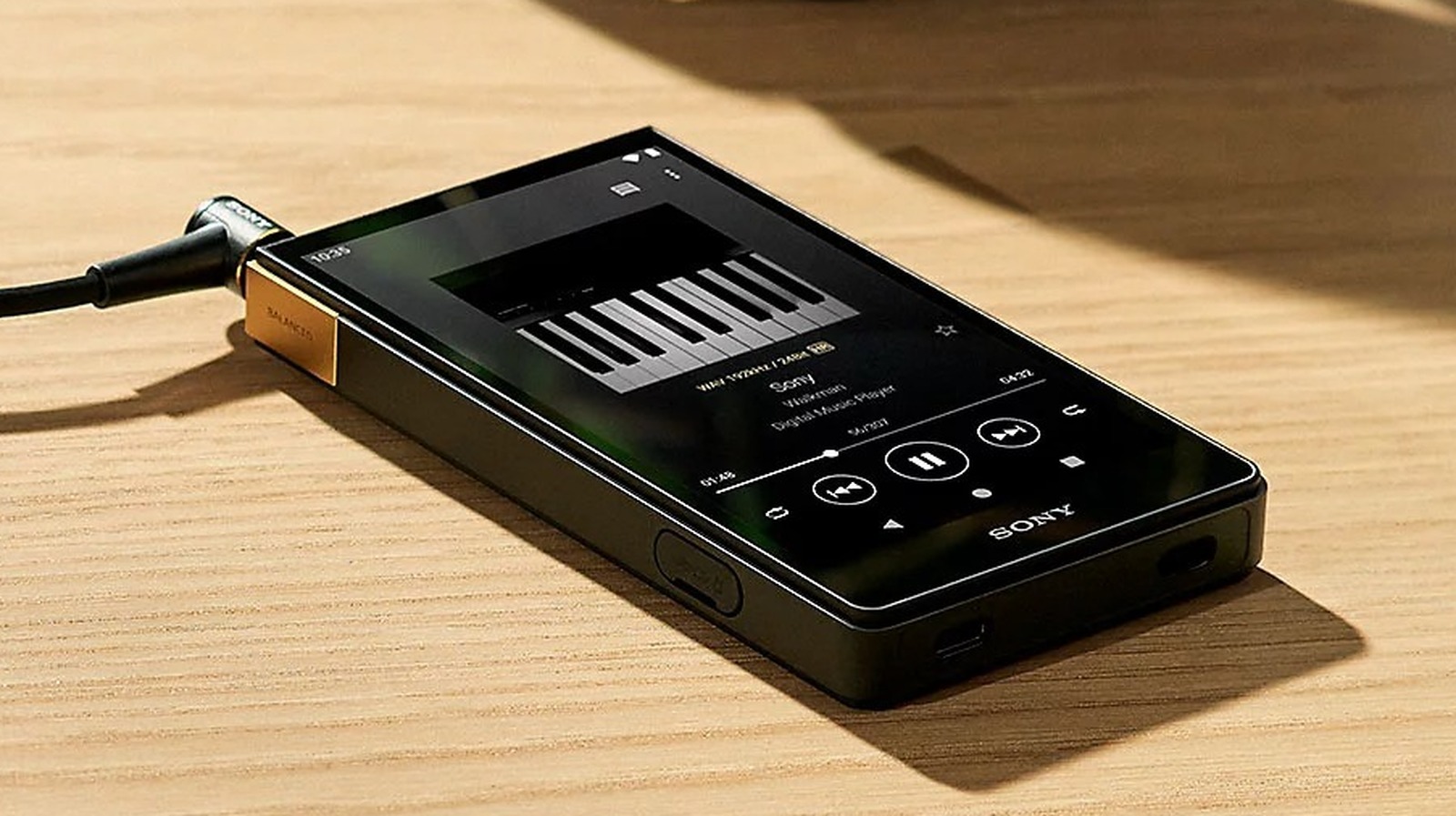I really hate this kind of headlines
It’s rampant click bait. I try not to reward the behavior with clicks, but sometimes I’m genuinely interested in the topic. This is not one of those times.
From the first line:
We may receive a commission on purchases made from links.
and when I copied that string, they added this to my clipboard:
Read More: https://www.slashgear.com/1347620/new-sony-walkman-cost-price/This is just an ad from a garbage blog.
Sony justifies the outrageous price tag of the NW-ZX707 by using high-end components. Things start with the large, solid high-polymer capacitor that acts as a battery assist for the amplifier block. Besides offering low resistance and large capacitance, it also aids in the product’s ability to output clear signals, according to Sony. Meanwhile, all of the bypass capacitors on the NW-ZX707 are also of the FT CAP3 type, which is a Sony parlance for high polymer capacitors. To supply the optimum balanced output signal from the digital amp, the NW-ZX707 uses a larger 8 mm coil for the lowpass (LC) filter.
In addition to these features, the Walkman uses low resistance Oxygen-Free Copper (OFC) for the internal headphone connector. The device also uses two compact low-phase noise crystal oscillators that aid in excellent instrumental separation and open sound reproduction. Sony has judiciously used gold across the internals of the NW-ZX707, including its solder and reflow solder elements, to further improve sound localization. The PCB of the NW-ZX707 has been designed to keep digital interference to the minimum by separating the audio black from the digital block.
#Sound processing done right
For audiophiles, one of the most important reasons for choosing the NW-ZX707 over other options is its capability to perform native DSD (Direct Stream Digital) decoding. This feature ensures the NW-ZX707 can transform standard MP3 or PCM audio to the ultra-high frequency 11.2 Mhz DSD audio stream. This lends the sound a distinct analog character that many audiophiles have come to love.
The NW-ZX707 also gets Sony’s proprietary digital music processing technologies, including the DSEE Ultimate technology, developed in-house to restore compressed music files to the quality of a CD by interpolating sound algorithms. DSEE Ultimate is Sony’s most advanced technology, which incorporates artificial intelligence to upscale compressed audio files to near-Hi-Res Audio quality. It also has a balanced headphone output that can deliver a more detailed and immersive listening experience.
Another reason audiophiles have come to appreciate the NW-ZX707 is something called the vinyl processor that lends the unmistakable character of vinyl discs back to their digital tracks. In addition to this, the device also gets a DC Phase Linearizer that gives users six phase character settings to choose from and select between multiple analog-like sound options. The Sony NW-ZX707 can last up to 25 hours of 44.1 kHz FLAC playback, up to 23 hours of 96 kHz FLAC High-Resolution Audio playback, and up to 22 hours with streaming music apps.
Then do like I do and downvote posts that have such shit titles
tldr; it’s $900 and has very fancy audio equipment.
Honestly there is a public. And I am quite certain in a few years I could be in the public to replace my Qudelix 5Kz but my true wish would be a collaboration between a phone company and a Dap company (and that I can use Gcam on it)
Well… it won’t matter once you listen to music on them with your shitty 20 USD headphones.
No no, I use the beats fit pro that are recommended in the article underneath. They actually suck hard, but the review seems to think they’re the second coming. So take all this with a grain of salt.
deleted by creator
Yea, I have found by far the biggest effect for me (and I have to imagine most people) is the speakers / headphones, not the digital processing or even the audio converters.
headphones or speakers can’t add the detail that mp3 (or streaming in whatever format) eliminates. Compare a CD and mp3 of the same track with a decent headphone (or a speaker) and you will hear that compression changes sounds.
but it all depends on what kind of music you listen to. For some of today’s music even laptop speakers are enough 🤷
Nah come on, bro. You and I both know laptop speakers are trash. Good headphones are a must. I’ve heard so many sounds I’ve never noticed before with good headphones.
yes 😁 yes, but this new vocoder popshit i’ve been hearing from bluetooth boxes in backpacks is good enough for laptop speakers
My point is just that most headphones that are cheap can’t reproduce MP3 quality, so until you get good enough headphones to hear the difference, getting a FLAC of the same song isn’t going to really be noticable.
agreed
It also won’t matter once you take a step outside; slightest ambient noise is enough to kill most of the advantages a high-end source provides.
That depends: proper Shure IEMs usually do a good job covering ambient noise. Somewhere north of 200 USD you usually get proper in ear monitors… but only if it’s from one of the regular professional equipment brands, otherwise you’ll probably pay for design or the name and little else.
Lots of audiophile bullshit pseudoscience words in this- at the end of the day, can I really hear a difference? If so, it’s probably worth it- but if this is just a version of the famous $1000 Denon Ethernet cable, then fuck off right?
It will sound better than streaming directly from your phone but it’s not worth it to most people. The cable conversation is a whole other subject. There are still audiophiles that claim that cables costing upwards of $1000 are worth it and sound better. It blows my mind.
I would just wait for techmoan or crinacle to test it and explain what is what, probably some sort of a cash grab is the correct answer but… maybe?
Techmoan isn’t dropping nearly $1k on a Walkman. Maybe in 15 years when he can get it off ebay for like $100. He likes his oddball music players but he’s not gonna pay the Sony Tax for no reason.
Quite frankly, I prefer that, I’d rather see him do a video on an obscure tape format that existed in Nordic countries for two years in the 60s than a new device all sorts of outlets will review.
Absolutely. The only thing is that if he did review modern devices, his reviews would actually be trustworthy and not just some paid advert like so many other channels are.
Don’t get it twisted now
There really IS a perceivable difference. When given the right hardware and audio, it is a whole nother world when it comes to clarity, definition, and everything in between.
However, it doesn’t have to be nearly this expensive. I don’t see any real reason for a lot of it to be the price it is just because it has “quality components”
Don’t get me wrong, with analog, the quality of the components are far more important than digital, but it is a logarithmic curve. You can only improve so much before the gains become diminished.
Just to be clear- it very well might be mind blowingly good I’m not passing judgement, I’m just saying that bilking “audiophiles” out of dollars for silly stuff happens every day. Gold plated hdmi cables filled with argon? Come on.
Having not used one of these walkmen yet I can’t say, I was just mentioning that the article had all the buzzwords of a $1000 1 foot gold Ethernet cable, that’s all!
You have a point with HDMI because that’s a digital cable.
Ethernet is also a digital cable.
Cable quality when it comes to digital doesn’t matter, but with analog it is far more sensitive to the quality of the materials used.
The walkmans are fine, I actually have an NW-A306 ($350). To be 100% clear, the other walkmans are PRETTY MUCH the same, you are mostly paying for a better build than anything. It’s a quality device but it isn’t like you really need anything better.
Your money is better spent on speakers or headphones over anything else. You can have the fastest car in the world but it doesn’t mean anything if you don’t have tires that can handle it.
Yeah excellent points! I also dont have any problem with buying quality because you like quality- that’s a perfectly valid reason. It grinds my gears when companies make up stuff to trick people into thinking something is quality when it’s just marketing buzz and bs. Like plastic sunglasses for $300.
The Walkman looks sexy as hell, and I’d be all over it if that was my thing!
It DOES look pretty sexy, but honestly the vanity of it isn’t even my concern. For the specs it has, $350 is pretty reasonable. My biggest thing about it is the ability to drive higher resistance headphones and also having a separate device to listen to music on!
Sony is definitely one of those brands that has hype from brand name, but the NW-A306 is definitely a good value for the buy. That being said however, a smartphone with an external DAC would suit most people’s needs perfectly fine.
A digital cable that meets spec can’t be made better by gold plating or other bling. But a sub spec cable or a cable with some aspect degraded by damage or wear or contamination will introduce errors that will force the system to use whatever error correction is built in(such as with tcpip) that will hinder data speed. So, you can have a digital cable that works slower than spec but still “works”. Especially when you are running any sort of significant distance or there is noise such as fromn ac power.
My point is that even with digital connections a better cable can make a difference. Just on the low end not the high end.
Oh yes most definitely. Thank you for clarifying and I 100% agree with that. I have had to deal with that first hand as I work as a network administrator and have had cheap “Cat6” cabling come and be wired right, but used aluminum which not only hindered the speeds but actually made the cable run HOT (probably fine in air but a fire hazard in a wall, this was plenum too).
Bad cable quality is for sure going to hinder performance, but yes, a $1000 gold HDMI cable (scam to begin with because gold wiring isn’t even that expensive) is silly. Funny because that cable is actually worse than standard HDMI cables now because of the current spec (think that $1000 cable was like 1.4 or something)
A very informative video on Linus tech tips where they ran a cable tester on lots of different cables. Super interesting.
I always tell people to get the full solid copper core cat6, no stranded, no copper clad.
At least for the important projects.
deleted by creator
I think they would have been a lot better off if they had included a fully functional phone. Who wants to carry around TWO bricks for slightly better audio?
I think the real missed opportunity is that they didn’t create a super hi-fi wireless headphone protocol and absolutely best-ever wireless headphones sell them together with the walkman.
They did. It’s called LDAC. Many would also agree that they make the best headphones and earbuds, I swear by their WH1000s and WF1000s
I swear by their WH1000s and WF1000s
Its a good thing lots of people do, cause they make my Xperia purchases $250 cheaper. The freebie buds go right to eBay.
I made the awful decision to go with Bowers & Wilkins over the Sonys. They sound okay, but the design is absolute garbage. Next time it’s Sony.
I’m the audience for this. I’ve bought previous android portable standalone players and it being a phone is actually a negative.
There are already plenty of good smartphone dacs so there’s no need to make a super high end battery chugging, chunky phone for a niche audience, when most people are just going to use Bluetooth headsets anyway and have a good experience doing so.
Im not just carrying these things around like a phone because the types of headphones I’ve run with these devices are not the type that I would bring with me on a bus or to the store. Portability really doesn’t matter to the target audience of these.
I pull my standalone player out when I want to sit in front of my my garden and listen to an album all the way through. Getting a call or a notification would kill that for me.
have you considered not using a android device for your expensive equipment? FLAC cant even get close to a CD
How is that the case? Lossless is lossless. Not trying to be a smartass, genuinely curious here.
Maybe he’s referring to that even if the source is 44.1/16-bit flac or wave (cd) the entire chain maybe isn’t. Maybe the firmware (android in this case) uses a fixed 48kHz sample rate which to me makes it sound a lot more dull. Maybe the dac in whatever is playing the flac file is objectively or subjectively worse than the one in the cd player (this matters a lot). Maybe the firmware doesn’t allow for exclusive access to the dac to whatever software is playing the flac file. A cd players is comparably simpler to program software for since it’s only made to do one thing which is to play one format at one sample rate and bit rate. That’s it.
Lossless sources doesn’t mean a lossfree playback chain from the software to the dac.
FLAC is literally “Lossless” compression. That’s what the L stands for. If you rip data from a CD, compress it with FLAC and then uncompressed that FLAC file you would have a bit for bit exact replica of the CD.
FLAC is the same or better than CD, as long as the source format is supported. I checksummed a CD, then ripped it to FLAC, and burned it back to a new CD and the hashes matched…what more do you want?
Hell, even the ability to connect multiples. Instant silent rave box
Why is this not more of a thing? I should be able to connect 3 headphones to my iPhone. Is it a limitation of Bluetooth somehow?
BT is generally a 1:1 secure connection. Very inaccurate description but serves our purpose. BT was originally designed waaay before smartphones as a way of maintaining low power wireless connectivity to stuff like keyboards and mouses.
It’s increased in ability since then, but a lot of the focus has understandably been on increasing the capacity of the ‘host’ of the party rather than the guests. More people can join the party (devices connected to your phone/pc), but they’re doing different activities at different times.
The challenge with audio is they all have to receive the exact same data at the exact same time otherwise humans notice - which the protocol wasn’t really designed for. There’s been some inroads, but it’s a bit of a protocol limit. This is why most BT headsets are a single unit - one receiver (guest), receiving the data then disseminating to its family group. Airpods get around this by having one that actually connects to your phone, then the second one syncs to the first pod. (Someone at the party chatting with a friend elsewhere on the phone, to stretch the analogy)
When you start mixing multiple guests of varying hardware wanting the same thing at the same time with varying latencies from the one host, it can get real messy, and we’re really good at picking up audio discrepancies
Yes
720 x 1280 pixels. The device runs Android 12 and also gets 64 GB of onboard storage
😂😂😂😂
Because I imagine it’s for old people sitting around their house
- Separate batteries. Using a device for music and a standard phone drains from the same battery. You could carry a power brick, but then you’re carrying two bricks for worse audio.
- No camera. Certain work assignments won’t allow me to bring a device with a camera into those zones. Or, if I do, the transition process is so intrusive that it’s not worth it.
Those are the only unique characteristics. You can compensate other differences on a phone like adding an additional DAC and/or amp.
Get that clickbait title out of here!
…None of this is new? Portable, standalone DACs have existed for years. Even DSD isn’t new. What Sony’s charging isn’t even out of line. Fiio charges (IIRC) $1200 for their Android-based player/DAC.
Wait until people hear about Astell&Kern’s ~$4000 ear buds.
$4k and they’re not even custom fit‽‽
I’m sorry if I’m paying FOUR THOUSAND REAL DOLLARS they’d better not come with the fucking tips I get with $20 buds.
Nice, they pre-tangled them for you.
This feature ensures the NW-ZX707 can transform standard MP3 or PCM audio to the ultra-high frequency 11.2 Mhz DSD audio stream.
That doesn’t make a lot of sense to me.
-
Humans can only hear up to about 20kHz, so you’re not getting much benefit above about double that.
-
Even assuming that humans could hear frequencies hundreds of times higher, audio isn’t generally available sampled at 11.2 Mhz. If you’re getting music, the recording and audio engineering work, the microphones, etc, aren’t designed to accurately capture data at high frequencies.
-
Even assuming that none of that were the case, the audio engineer and artists weren’t trying to make audio that sounds good at that frequency (which they can’t hear either). The music doesn’t intrinsically have some aesthetically-pleasing quality that you can extract; they were the ones who added it, and they did that via making judgments using their own senses, which can’t hear this.
-
Even aside from that, it doesn’t look like this comes with headphones. Whatever you are plugging into this has to induce vibration in the air for it to make it to your ears, and probably does not have a meaningful frequency response at that frequency.
The NW-ZX707 also gets Sony’s proprietary digital music processing technologies, including the DSEE Ultimate technology, developed in-house to restore compressed music files to the quality of a CD by interpolating sound algorithms.
And it makes even less sense if your starting audio has actually thrown out data in frequencies that humans can hear by using lossy compression there, even if we aren’t terribly sensitive to those.
MHz refers to the samples per second, not the pitch. CD audio for example is 16-bit/44.1kHz. What that means is there are 16-bits of sampling (audio) taken 44,100 times per second. DSD on the other hand is 1-bit samples taken 11.2 million times per second, this is referred to as DSD256. What that translates to is a digital wave that looks a lot closer to an analog wave than a CD does. It has nothing to do with the frequency of listening in this case.
If you’d like to learn more, check this out.
You should also check this out: https://www.youtube.com/watch?v=cD7YFUYLpDc
Here is an alternative Piped link(s): https://piped.video/watch?v=cD7YFUYLpDc
https://piped.video/watch?v=cD7YFUYLpDc
Piped is a privacy-respecting open-source alternative frontend to YouTube.
I’m open-source, check me out at GitHub.
I think this article covers it more succinctly https://en.wikipedia.org/wiki/Nyquist%E2%80%93Shannon_sampling_theorem
edit:
also relevant: https://en.wikipedia.org/wiki/Delta-sigma_modulation#
Yeah the entire article smells like gold plated HDMI cables from Monster, as if that somehow improves the quality of digital signals.
Sony has judiciously used gold across the internals of the NW-ZX707, including its solder and reflow solder elements, to further improve sound localization.
Gold has a higher resistivity than copper. Resistance adds noise. It’s probably just for corrosion resistance.
Another reason audiophiles have come to appreciate the NW-ZX707 is something called the vinyl processor that lends the unmistakable character of vinyl discs back to their digital tracks.
So they further distort the sound to replicate lower quality equipment? They’re definitely not making it sound more like the original by introducing vinyl artifacts.
This is some serious hobbyist pricing bait, but I can’t judge since I’ve got my own dumb expensive hobbies.
This feature ensures the NW-ZX707 can transform standard MP3 or PCM audio to the ultra-high frequency 11.2 Mhz DSD audio stream.
I think the article is just incorrect. Sony probably means it can just decide .dsf files. And you are confusing 1 bit DSD with 16 bit PCM. The most common DSD format is DSD64 2.8Mhz which is equivalent to 16 bit /176khz, 24 bit/117khz, or 32 bit/ 88.2khz. And the microphones and instruments do work at these high frequencies.
No, the product page mentions the “DSD Remastering Engine”, which says the same thing as the article. They probably just mean they’re using a 1-bit DAC, and are trying to pass that off as a selling point. Although the article did lose the “1-bit” part.
Then I stand corrected, although the article does conflate DSD decoding with The “remastering engine”. Just cause it can decode it doesn’t mean it can resample PCM into DSD. Those are 2 seperate features.
the benefit of sampling above 20khz is that you can even out the signal over a period of time which will make it more accurate for frequencies up to 20khz. you will get a noisy signal but all the noise is in frequencies you can’t hear.
you also need to consider how the voltage is generated. in general there are limits regarding how quickly can voltage surge. e.g. you can’t reproduce a square wave properly in most cases after amplification. in the end this makes dsd much less relevant.
you also need to consider that the reproduction is not perfect and neither is the recording. e.g. a square wave will not be captured properly
edit: I forgot to mention that the slew rate limit has a parallel on the speaker/headphone membrane but it’s much worse than the amp since it’s a physical object with momentum.
Let me add that I don’t think that we are at the end-all-and-be-all of audio. I can hypothetically imagine things that might be done if one threw more money at audio playback that would create a better experience than one can get today.
-
When you hear audio from a given point, some of how you detect the location of an audio source is due to the effect on it hitting your ears, which are of a distinct shape, which means that what’s actually hitting your inner ear is slightly unique to an individual person Currently, if you’re listening to a static audio file, it’s the same for everyone. One could hypothetically ship hardware which fits inside the ear of and can build an audio model for the ear of a given individual to make audio which reflects their specific ears. Then audio could be played back that sounds as if it’s actually coming from a given point in space relative to someone’s ears. That’s not a drop-in improvement for existing audio, because you’d need to have 3D location information available about the individual sources in the audio. But if audio companies wanted to sell a fancier experience for audio that does have that information, they could leverage that.
-
For decades, audio playback devices have tried to produce visual effects that synchronize with music. They haven’t done a phenomenal job, at even basic stuff like beat detection, in my opinion, and so clubs and the like have people that have to rig up DMX512 gear with manually-created annotations to have effects happen at a given point. Audio tracks today don’t have a standard format for annotations; if I go buy an album, it doesn’t come with something like that. One could produce a standard for it and rig up various gear, like strobes or colored light or even do this in VR, to stimulate the other senses in time with the audio.
-
I suspect that very few people listen to audio in an environment where they can hear absolutely zero detectable background sound when they don’t have their audio playing. You can get decent passive sound cancellation devices, but they only go so far; even good passive sound cancellation headphones are something that one can probably hear fairly quiet sound through. Right now, active sound cancellation devices are being worked on, but that doesn’t get one to the point of inaudibility either, and I haven’t seen anything that does both good active and passive cancellation, so using active noise cancellation means giving up good passive noise cancellation.
My point is that I think that there are remaining areas for audio hardware companies to explore to try to create better experiences. I just don’t think that playing audio at a sampling frequency hundreds of times above the frequencies that humans can hear is really a fantastic area to be banging on.
you’d need to have 3D location information available about the individual sources in the audio
Isn’t that what Atmos is supposed to do. Although currently we don’t have personalized HRTFs for it.
-
-
I feel like the author is pretty clueless when it comes to audiophile grade digital audio players. They’re remarking about the $900 price tag like it’s some kind of high water mark for a device when there are Astell & Kern and iBasso units that cost 2-3x that.
The Sony Walkman devices are consistently well-rated. This is going to be a good player for those looking for a dedicated music device.
Yeah “Costs more than you think” no I think it costs about what I expected for a lossless player. DACs are a feature these days.
There are also used units like the Pioneer XDP-100 which is still good, but the Android bit is slow.
Interesting read. Honestly it sounds cool with all the specs underneath the shell. But obviously it’s just not worth unless you have the ear for it. In other words, you’d have to be a sound engineer to really get the most out of something like this.
I have hard time believing that anybody can hear difference with this and good quality phone.
I associate audiophiles for people that think they can hear difference when they pay extra but actually don’t when blind-tested. This seems to be perfect product for them.
Audio engineer here, it’s a trainable skill that takes a long time with comparing audio side-by-side
At to some point you can but after CD-quality you cannot. Did you read the article?
As sound engineer you should know that you use high quality to record but it makes no extra sense after CD-quality to listen.
Listen to a standard mp3, then listen to the same song as 32/96k FLAC. I bet most people can hear a difference. But no worries if you can’t, its not a big deal
Mp3 is not CD-quality. As sound engineer you should know the difference. MP3 is old lossy format and you are comparing it to loseless.
There is people that can hear those differences in certain corner cases.
Also you are not defining any specs for mp3 but you are giving specs for FLAC. Why?
Can you hear difference between CD-quality and 32/96k FLAC? If you think you can then you are audiophile and not sound engineer.
Oh hunny…I didn’t say an mp3 is CD quality, you assumed that. I gave specs for the FLAC because “standard mp3” has specs; therefore you have two sets of specs to compare, silly goose. I can hear a difference, but that’s because any studio engineer that is worth their money is going to be both.
Because I was talking CD-quality not mp3. Anybody can hear difference between bad mp3 and loseless format. That is not issues.
Mp3 has two differend standards using the same name and at least mpeg-2 supports several frequencies. So there is no ”one mp3”.
Talking about three decades old lossy standard in 2023 is really stupid. There is even better lossy standards around.
With you knowledge I have hard time believing you work as audio engineer.
if listening to music from a “good quality phone” is enough for you, good for you. But why would you need to dis people who are craving for a better sound ?
They’re trolling on Lemmy, I guess? Haha I don’t feel dissed though, its just communication
I am not dissing. Just saying that you propably cannot hear difference in quality with that. The device has properties that do not make sense in listening quality.
oh boy everyone will argue about audio specifications again. For the record standard MP3 is fine and is perfectly representative of the recording it did within the bandwidth of human hearing
That depends on which MP3 though. Is it 128kbps? Because that’s dog shit. 192 will sound fine to most. I don’t go below 256 and that’s only if I can’t get 320.
256 is solid but V0 is the best balance of size and quality for me. I also respect V2 for the smaller but still quality 192kbps VBR files
Anybody using a 30 year old encoder instead of opus really isn’t trying when it comes to lossy audio.
Well damn now I have to AB test some codecs
I should have specified CD-quality audio anyone that’s seen a deep fried jpeg should know why you don’t compress a mp3 too much
deleted by creator
I own this.
I’m guessing the author doesn’t have this issue, but the model sold in the US has a volume
limiterlimit on them. My daily headphones aren’t easy to drive, so this was a concern I have that many other people might not care about.I ended up having to import mine to get a device that doesn’t have this enforced.
Edit: Sorry I was clumsy with my words. It’s a limit on volume, since it’s an option for high gain.
I had that problem with a A55 but luckily Mr Walkman has firmware that sorts it.
Sony is taking advantage of audiophiles’ desire to compulsively spend more money on better measurements with imperceptible improvements. Nothing wrong with that - most audiophiles are self-aware and know that it’s really higher prices that make music sound better. It will be interesting to see what audiophiles say about these new Walkmans.
There are already similarly priced and cheaper alternatives, including a $350 option by Sony, and $800-$1500 options by Astell & Kern. Stand-alone music players aren’t extinct as this writer seems to think.
As an audiophile I would never spend this much because I also know that getting transparent audio is dirt cheap these days and these high end devices often don’t measure well in ways that do matter, for example their output impedance.
There’s a business phone switch owned by many of our customers for which licenses for file-based music-on-hold are no longer available from the manufacturer. An old iPod / Nomad / Zune / etc. fits the bill to connect to its built-in, no-additional-license-required music-on-hold audio port perfectly. It even comes with its own built-in UPS.
audiophiles i know don’t listen to their music while walking. None of them would spend a cent on any portable device.
deleted by creator
I am very upset that I can’t find good midrange players. Either cheap crap or hyper-expensive things like this. My last one broke and I don’t buy the replacement parts solely because I still have hope of finding an appropriate one. For now, I use a perma-offline, degoogled smartphone for this (because I heavily prefer not to use a smartphone in daily life normally), but using a relatively big and heavy brick for a player is VERY inconvenient if you’re used to a small lightweight device.
There are dozens and dozens of options for a music player in all price ranges. Look at the list below for a start.
https://www.head-fi.org/threads/hi-res-portable-daps-comparison-chart-2022.961903/
Am thinking phones are meant to fit that range. DACs they have are usually better than cheap garbage but far from “hi tech stuff”. You can also get a good USB-C DAC and improve the experience.
I look forward to Techmoan blowing his money on one of these to do a video.
If we had lemmy money I’d bet against that. I can’t see him bying that.






















